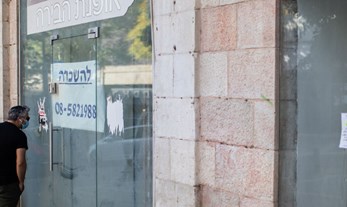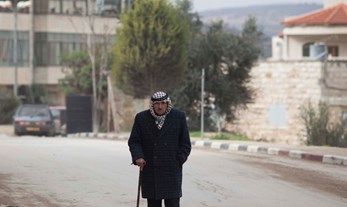


On the Fringes of Ultra-Orthodox Society
Written By: Dr. Asaf Malchi
Government agencies have not geared up to effectively address the phenomenon of marginalized ultra-Orthodox youth

The Economic Impact of COVID: Survey Finds Decline in Financial Liquidity Among Israeli Workers
Written By: Yarden Kedar
A special IDI survey on the economic impact of the COVID crisis finds that worker's financial liquidity has declined sharply with 31% of respondents reporting that they had no liquid funds to support themselves.

The Ruling by the International Criminal Court: Background, Analysis, and Implications
Written By: Prof. Amichai Cohen
The ICC's ruling to allow the possibility of an investigation into Israeli actions is only the start of a process that is likely to go on for many years. What are the next steps and what are the possible implications for Israel?

Did You Know? Israel has no Law Guaranteeing the Basic Right to Equality
Written By: Dr. Amir Fuchs
A bill to include the right to equality in Israel's Basic Laws recently passed a preliminary reading in the Knesset. This is a much-needed amendment to an existing law, which would provide Israelis with legal provision that exists in the constitution of all democratic countries.

A Prime Minister on Trial: Qs and As
Written By: Dr. Amir Fuchs
The Prime Minister's trial reconvenes with a pandemic raging and the elections camping continuing. What can we expect?

IDI Holds Forum With Party Leaders for First-Time Voters
In a special broadcast ahead of the March election, first-time voters were given the opportunity to pose difficult questions to leaders of the major parties.

Majority of Israelis: Netanyahu’s Efforts to Forge Ties with Arab Public Insincere
Written By: Prof. Tamar Hermann, Dr. Or Anabi
A large majority of Israelis think Netanyahu’s efforts to forge ties with Arab Israelis are insincere - 25% of Arab Israelis think they should nevertheless cooperate.

IDI Mourns the Passing of its Chairman, Secretary George Shultz
It is with great sadness and a profound sense of loss that the Israel Democracy Institute acknowledges the passing of Secretary George P. Shultz, one of the greatest statesmen of the twentieth century.

On the decision by the ICC in The Hague
IDI Vice President Prof. Yuval Shany on the decision by the International Criminal Court in The Hague (ICC): "It will be a long time before the investigations mature into indictments or arrest warrants."

Who's Running? The Final Lists of Parties and Candidates for the 24th Knesset
Written By: Prof. Ofer Kenig
The final list of parties and candidates have been submitted and it appears that at least 20, perhaps even 30, of the 120 MKs elected in 2020 will not serve in the next Knesset.

How Many Knesset Members Have Lasted in Politics Since 2009?
Written By: Prof. Ofer Kenig
The data reflects a very high turnover rate in Israel's political system. This has both positive and negative aspects. On the one hand - a robust political system should be refreshed - but it can also be a symptom of a "sick" system

The War on Crime in Israel's Arab sector isn't a Negotiable Commodity
Written By: Dr. Nasreen Haddad Haj-Yahya, Adv. Oded Ron
Arab citizens have the right to feel that their security is protected by the government. This right should be respected and protected declaratively and in practice.

The Labor Party Primary Elections
Written By: Prof. Ofer Kenig
Labor was the only political party to elect its chair and candidates for the Knesset in primary elections consecutively since 1992 – including in the 2021 election. While its membership is dropping, this is consistent with ongoing trends in most Western democracies.

Online Platforms are Making Up Free Speech Rules as They Go—and It’s Concerning
Written By: Prof. Yuval Shany
Banning users from social media platforms raises concerns about free speech protections online

COVID-19: Initial Survey Findings on Self-Employed Workers in Israel
Written By: Daphna Aviram-Nitzan, Yarden Kedar
As of the beginning of December 2020, 75% self-employed workers were working, though 45% were working only part-time. Only 29% were working the same number of hours as before the crisis.

1/3 of Complaints against Rabbinical Judges in Israel are Justified
Written By: Dr. Ariel Finkelstein
A new study by IDI expert Ariel Finkelstein presents a detailed and systematic analysis of the conduct of Israel's rabbinical courts - finds 30% of complaints categorized as: "Violation of the Principles of Natural Justice"

Gearing up for the Elections in a Political Town: Kafr Qassem a Test Case
Written By: Dr. Arik Rudnitzky
Arab Israelis want to see their representatives in the Knesset and are willing to go out to vote to ensure this happens. Kafr Qassem could be the test case for the larger Arab community who are more likely to vote if they feel that their Knesset members are representing them faithfully.

Did You Approve WhatsApp’s New Privacy Policy? Say Goodbye to Your Privacy
Written By: Dr. Rachel Aridor-Hershkovitz
The public should protest the violation of its privacy - so that regulations can be put into place to protect everyone

Task Number One for the Incoming Police Commissioner
Written By: Dr. Guy Lurie
The public has given the Police a failing grade for fairness and transparency. Does the public believe this can change? Not really.

IDI's 2020 Democracy Index: Public Trust, Social Solidarity and Democracy in Danger
Israeli Democracy Index 2020 reveals the lowest point in a decade in the public's trust in all public institutions and government officials—particularly in the Knesset and the Supreme Court – as well as major erosion of the public’s sense of social solidarity.

IDI's 2020 Democracy Index: Erosion in Israelis' Assessment of Police
Israeli Democracy Index 2020 reveals sharp decline in assessment of relations between the police and the public since the outbreak of COVID-19. A majority of Israelis believe that the police does not take criticism seriously

IDI's 2020 Democracy Index: Trust in HMOs is Higher Than All Other Public Institutions
Israeli Democracy Index 2020 included a focus on Israel’s healthcare system and found higher levels of satisfaction with HMOs than with hospitals and public trust in Sick Funds is higher than in any other public institution surveyed

IDI's 2020 Democracy Index: Jewish Israelis Prefer That Matters of War and Peace be Decided by Jewish Majority
Israeli Democracy Index 2020: 75% of Jewish Israelis think that crucial decisions on matters of peace and security should entail a Jewish majority; Almost 60% of Jews believe that most Arab citizens of Israel want to integrate into Israeli society

Israel Heads Toward Its Fourth Elections
Written By: Yohanan Plesner
After failing to meet the December 22 deadline for passing a budget, Israel is headed towards a once unfathomable fourth election in less than two years. The results of the last three elections in 2019-2020 did not dispel the political turmoil - we are about to see if the results from the fourth elections in 2021 will be any different.

Israel’s Unique Challenges Require a Strong Leader
Written By: Prof. Tamar Hermann, Dr. Or Anabi
53% of Israelis agree or strongly agree that dealing with Israel’s special problems requires a strong leader who will not worry about the Knesset, the media or public opinion.

IDI Dedicates the Viterbi Family Center for Public Opinion and Policy Research
The Israel Democracy Institute has renamed its renowned center for public opinion and research in honor of Dr. Andrew J. Viterbi.

Wave No. 3 is Here – We Must Learn our Lesson
Written By: Ron Tzur, Prof. Nissim Cohen
Politicians and healthcare practitioners alike must learn from their experience and formulate strategy before it is too late.

Halting Legislation in the Knesset and No Government Meetings
Written By: Dr. Amir Fuchs
With the exception of issues related to the coronavirus pandemic, this Knesset has passed almost no legislation, and this government has met only rarely.

Little Support for Equal Division of Domestic Tasks Among Ultra-Orthodox Men
2020 report finds that Ultra-Orthodox men do not support an egalitarian division of domestic tasks. Only one-third of ultra-Orthodox Israelis believe that paid employment is the best way for women to achieve independence.

38% Increase in the Number of Ultra-Orthodox Students in Technological Training Tracks
The 2020 Statistical Report on Ultra-Orthodox Society in Israel found that over the last five years there has been a 38% increase in the number of ultra-Orthodox students in technological training tracks. The most in-demand subjects in academia are education and teaching, social sciences, and computer science.
.

